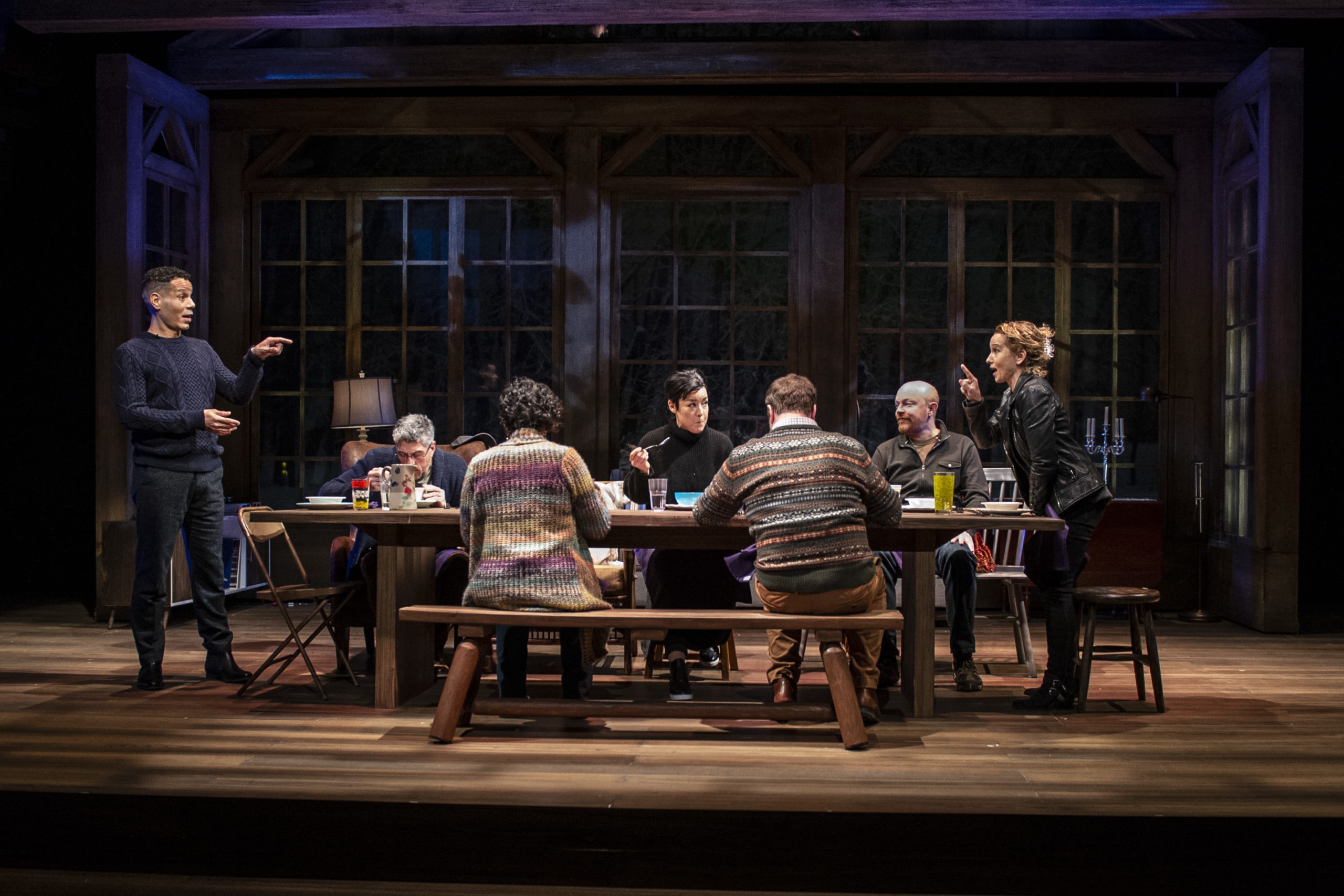Shipwreck: A History Play About 2017, the new play by Anne Washburn in its US premiere at Woolly Mammoth Theater Company, summons the dread and dysphoria of primarily white liberals following the 2016 election.

With painfully familiar discussions about the futility of activism, media manipulation and our culture’s widespread amnesia rehashed among a group of friends, I can’t say the Shipwreck experience was a particularly pleasant one — or a productive one for that matter. If anything, the show’s success lays in its ability to viscerally invoke the haze of confusion and nihilism plaguing the liberal Everyman’s engagement with politics. I can’t help but think we get enough of that in our daily lives.
Directed by Saheem Ali, the bulk of the play’s nearly three-hour runtime takes place in an upstate New York farmhouse. On the eve of an epic snowstorm, Jools (Anna Ishida) and Lawrence (James Whalen), who recently purchased this red-county-situated rural getaway, have invited their group of friends to commune and unplug from the everyday grind. Joining them are Jim (Jeff Biehl) and Teresa (Alyssa Keegan), a middle-class couple arriving directly from an all-nighter helping friends with a new baby; Andrew (Tom Story) and Louis (Jon Hudson Odom), partners and wealthy one-percenters; and Allie (Jennifer Dundas), a fiery internet activist (though that’s not her actual job).
As the title suggests, this is a work about the events of 2017 — the fallout of 2016, the James Comey scandal and the sort of flailing psychological adjustment period that followed. Among small talk and practical matters as the snowstorm sabotages the group’s dinner plans, Trump is the hot-button topic that seems to equally interest and annoy each member. Conversations inevitably swerve back into this murky territory, and in the process, emotions run high and touchy secrets are confessed.
Allie goes on many a tirade as she bemoans her friends’ lack of fervor, and playwright Washburn does well to complicate the group’s most visibly outraged character by underlining the easy, cushy modes of her resistance — like posting US Senators’ phone numbers on Facebook. Dundas wonderfully plays the part with a childish, nervous exasperation; she is a woman seemingly always on the verge of passing out, and though her intentions are good, so, too, is she shown as being spoon-fed outrage by the media.
Louis, a lawyer, is Allie’s greatest adversary. The most cultivated of the seven, he can breezily explain the foundations of Western democracy and the roots of the Peloponnesian War. A severe intellectual type with a dark streak, Louis is not one to swallow liberal media coverage without questioning the facts, and his skepticism challenges the group’s means of finding comfort, i.e. that liberals are morally right, and Trump-supporters are lying numb-nuts. Odom, one of Woolly’s very finest regulars, impresses with a simmering arrogance and gravitas, and his character’s disruptive line of questioning and ease with words make it easy for him to be the center of attention.

Yet no cabin-bound character gets the stage to himself quite like Mark, played with raw longing and inner turmoil by Mikéah Ernest Jennings. Jennings succeeds in carrying the play’s emotionally earnest dimension — a welcome reprieve from the follies of the main group, even if Mark’s story is woefully under-baked. Shown like a ghost wandering silently through the farmhouse as the others partake in heated discussion, Mark occasionally punctuates the chatter with asides about his life as a young boy adopted from Kenya by devout white farmers, and whose identity as someone raised in an all-white community is a constant source of struggle. Positioning this black man’s life in seemingly another dimension from the friendly squabbles of these other white and/or immensely privileged individuals, speaks to the disjointed nature of our times.
As a visual timeline in Woolly’s entrance hall demonstrates, 2017 was the year of Trump’s ascendance and the Ku Klux Klan rallies in Charlottesville. So, too, it was the year of the film Get Out and Colin Kaepernick. How do we even make sense of such discordance? Washburn cleverly taps into this state of confusion, but in so doing, glosses over the race elements in the play as if the experience of being a black man is always-already profound, loosely attaching it to the main storyline of white political exasperation in an attempt to render both things more meaningful by association. Washburn’s characterization of Mark as someone who is in many ways estranged from his own blackness is also questionable. His monologues are often obtuse and poetic, and posing no real critical challenge, he’s drawn as a more palatable subject for white empathy.
Although brilliantly performed by all its cast members, Shipwreck’s political message falters. It is more reactionary (a recent trend in the contemporary theater) than it is a careful exploration of our psychological delusions and fragmentation. Washburn visualizes certain secret meetings with Donald Trump (played with a flat affect by Biehl) in the cartoonish fashion of the liberal imaginary. One such meeting with former FBI Director James Comey (Odom plays double duty here) takes place in a ceiling-high, eerily menacing cavern by Scenic Designer Arnulfo Maldonado; waiters donning gold Egyptian masks and robes, like something ripped out of Eyes Wide Shut, stand at attention with platters of Trump steaks. Trump and his cohorts are presented as moustache-twirling villains dealing in high stakes and high-tragedy, but thankfully, the performances do not succumb to the easy pleasures of imitation (God knows we should respect our actors enough not to demand of them yet another Trump impression).
These fantasy Trump encounters, intended to induce laughs and create estrangement, feel ultimately gratuitous and unchallenging. Looking back at the events of 2017 from today in 2020, Shipwreck feels like a retread rather than an illumination, poking fun at our everyday attitudes and beliefs even though our wounds have already scabbed over.
Running Time: Three hours, including one intermission.
Shipwreck: A History Play about 2017 plays through March 8, 2020, at Woolly Mammoth Theater Company, 641 D Street NW, Washington, DC. Purchase tickets at the box office or go online.
Arnulfo Maldonado, Scenic Designer; Dede Ayite, Costume Designer; Colin K. Bills, Lighting Designer; Palmer Hefferan, Sound Designer; Projection Designer, Jared Mezzocchi; Production Stage Manager, John Keith Hall; Dramaturg, Sarah Lunnie; Casting Director, Judy Bowman; Fight Choreographer, Robb Hunter; Composers, The Bengsons.
RELATED: John Stoltenberg’s Magic Time! column, “Actor Mikéah Jennings unpacks his powerful performance in ‘Shipwreck’”




